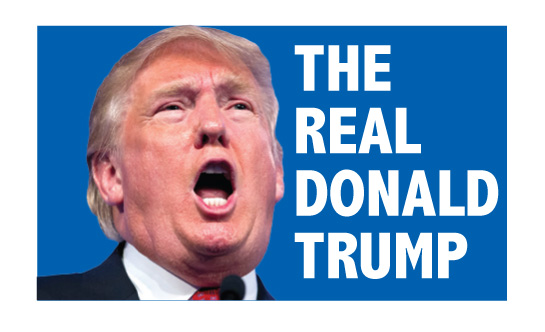With eight days remaining until the Iowa caucuses, it is clear that Donald Trump has a serious chance of winning. He also holds a robust lead in New Hampshire and in states that follow. In short, he stands a reasonable chance of becoming the Republican nominee for president.

There are reasons to doubt that his campaign can turn out his supporters on election day and get them to vote, but he has enough of them to win if they do. A large share of these people are convinced that his brand of politics — it’s a blend of nationalism, celebrity and a will to shock — are the right answers to America’s problems.
These supporters are unlikely to be persuaded otherwise. But there are others, conservatives who like Trump’s frank disrespect for liberal elite opinion, who want to believe he shares their principles. These people could veer away from Trump before Iowa votes on Feb. 1, and they need to look long and hard at Trump before they boost him further.
To help them do so, Washington Examiner will be devoting all its editorials this week to an examination of Trump’s positions in key areas. He says he is likely to “run the table” if he wins Iowa and New Hampshire, and who would bet that he is wrong. So we’ll reveal the real Donald Trump each day until Friday, here in Washington Examiner magazine and at our website, washingtonexaminer.com. Conservatives need to weigh Trump’s history and record, and realize he is not one of them.
Although he has never voted for a conservative in a GOP primary and has given money mostly to liberal Democrats, Trump’s current incarnation does bear superficial similarities to conservatives. Like many of them, he lives at the edge of the Republican Party, looking in from the outside. As this week’s cover story notes, he articulates a widespread anger and gloom about the state of the country. He shares with some conservatives a restrictionist view on immigration. He comes from a business background, he talks tough on foreign policy and he disparages President Obama with the best of them.
Yet in his own campaign promises and stated beliefs, there is a an ideology and an instinct that are at odds with bedrock conservative principles. Trump does not share a commitment to property rights that lies at the heart of what originally made America great. He defends to this day his own well-documented use of government power to expropriate the property of others.
Trump has only recently embraced most of the conservative-sounding positions he claims to hold dear. It’s true that no movement thrives without converts, but Trump’s radical conversions on gun rights (he supported gun control until recently), abortion (he opposed even a ban on partial-birth abortion), taxes and even his signature immigration issue seem to have come conveniently close to the election which he is now contesting.
Meanwhile, his choreographed and very deliberate promise to create a registry for all Muslims in America is utterly at odds with the principle of religious freedom for which conservatives have fought with vigor, especially in recent years.
Finally, Trump’s instinct for executive power should be unsettling for anyone who subscribes to conservative ideals. His admiring statements about Russia’s dictatorial president, Vladimir Putin, do not evince any belief in limits. Many of the promises he has made, such as to shut down segments of the Internet and to establish mandatory sentences for state crimes, suggest that as president he would do what Obama has done, by arrogating unconstitutional powers to himself and usurping the authority of the people’s elected respresentatives in Congress.
American conservatism is a serious philosophy with deep intellectual roots. This remains true even though some conservative politicians do not reflect its gravity. Conservatism seeks to protect the constitutional order and its tight limits on government power, viewing this as a precondition for human freedom and flourishing.
American conservatism is a small-L libertarian philosophy that trusts individual citizens and leaves them to their own devices as much as possible. It is deeply committed to personal, political, economic and religious liberty, even though such freedoms often make society a bit messy. Conservatism is especially on guard against plunderers who would use the power of government to take advantage of their fellow citizens.
We do not believe that Trump’s candidacy falls anywhere within this tradition, and in coming days we will lay out a case that all conservatives need to consider before they make the wrong choice and regret it.
